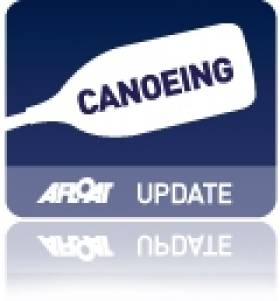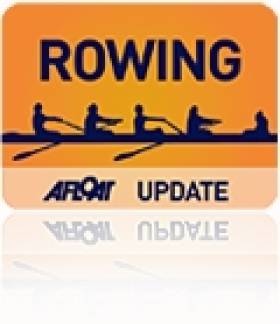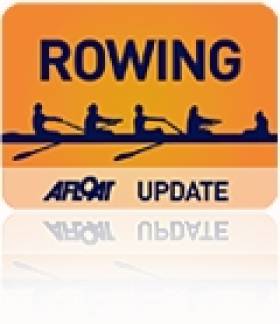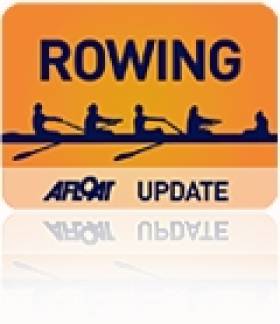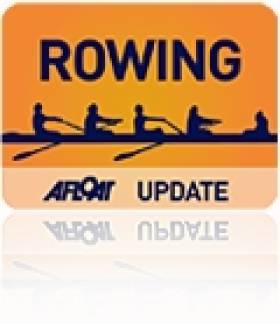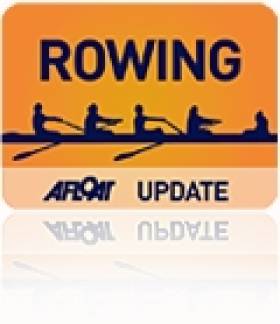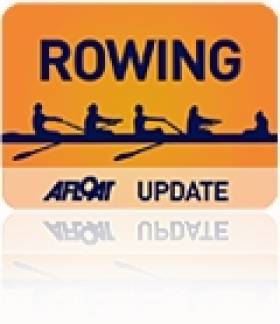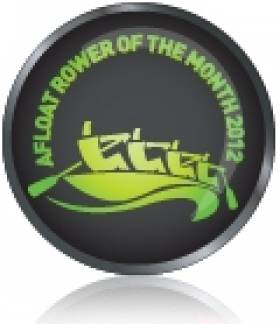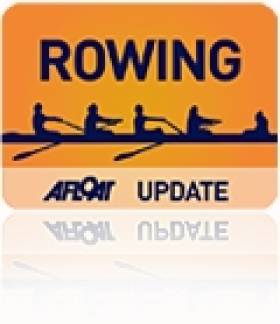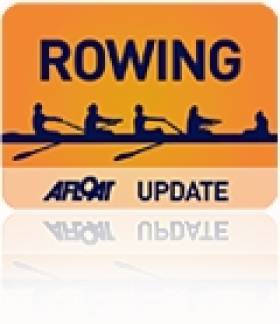Displaying items by tag: Ireland,
Jenny Egan Places 16th at Canoe Marathon World Championships
# CANOEING: Ireland’s two senior competitors at the Canoe Marathon World Championships finished in the top 20 in their classes in Rome today. In the women’s K1, Jenny Egan had a frustrating run which included a capsize and was eventually placed 16th. This was just over seven minutes behind Renata Csay of Hungary. In the men’s K1, Peter Egan was 17th. The event was won by Spain’s Ivan Alonso.
Canoe Marathon World Championships – Day Two (Irish interest)
Men
K1 Senior: 1 Spain (I Alonso) 2 hours 11 mins 43.120 seconds; 17 P Egan 2:16:28.870.
Women
K1 Senior: 1 Hungary (R Csay) 2 hours 1 minute 2.710 seconds; 16 J Egan 2:08:05.460
Galway's Kenny In Semi-Finals at World University Rowing Championships
# ROWING: Niall Kenny won his repechage to qualify for tomorrow’s semi-finals of the lightweight single sculls at the World University Championships in Kazan in Russia. The 24-year-old Galway man had finished last in a difficult heat earlier, but he led through all four quarters of the semi-final, beating Rusian Momot of the Ukraine into second. Estonia’s Tamor Bakhoff took the third semi-final place.
World University Rowing Championships, Kazan, Russia – Day One (Irish interest)
Men
Four – Heat Two (First Two to A Final; rest to Repechage): 1 Netherlands 6:08,18, 2 Germany 6:08.22; 3 Italy 6:16.97, 4 Ireland (E Mullarkey, S O’Connor, S O’Driscoll, T Lynam) 6:24.25.
Lightweight Single Sculls – Heat Two (First Three to A/B Semi-Final; rest to Repechage): 1 Switzerland 7:07.60, 2 Poland 7:08.95, 3 Italy 7:09.48; 4 Ireland (N Kenny) 7:29.71. Repechage (Threee to Semi-Finals; rest to C Final): 1 Ireland (Kenny) 7:48.29, 2 Ukraine 7:50.64, 3 Estonia 8:20.69; 4 Malaysia 8:29.94.
Women
Four – Heat Two (Winner to A Final, rest to Repechage): 1 Russia 6:51.90; 2 Poland 7:04.19, 3 Ireland (A Greene, E Kerrigan, H Lavery, C McIlwaine) 7:17.07.
Lightweight Single Sculls – Heat Two (First Two to A Final, rest to Repechage): 1 Ireland (C Lambe) 7:53.86, 2 New Zealand (L Tester) 7:59.70; 3 Czech Republic 8:02.39, 4 Mexico 8:27.96, 5 Italy 8:40.06.
Ireland Crews Get Second Chance to Join Lambe in University Rowing Finals
# ROWING: Three of the four Ireland crews are bound for repechages after the first round of competition at the World University Rowing Championships in Kazan in Russia. The men’s four finished fourth in their heat and the women’s four third in theirs. Lightweight single sculler Niall Kenny finished fourth in a heat he led for for the first 1,000 metres.
Ireland’s day started with a fine win for Claire Lambe in her heat of the lightweight single sculls and she will go into Sunday’s final as one of the favourites.
World University Rowing Championships, Kazan, Russia – Day One (Irish interest)
Men
Four – Heat Two (First Two to A Final; rest to Repechage): 4 Ireland (E Mullarkey, S O’Connor, S O’Driscoll, T Lynam).
Lightweight Single Sculls – Heat Two (First Three to A/B Semi-Final; rest to Repechage): 1 Switzerland 7:07.60, 2 Poland 7:08.95, 3 Italy 7:09.48; 4 Ireland (N Kenny) 7:29.71.
Women
Four – Heat Two (Winner to A Final, rest to Repechage): 1 Russia 6:51.90; 2 Poland 7:04.19, 3 Ireland (A Greene, E Kerrigan, H Lavery, C McIlwaine) 7:17.07.
Lightweight Single Sculls – Heat Two (First Two to A Final, rest to Repechage): 1 Ireland (C Lambe) 7:53.86, 2 New Zealand (L Tester) 7:59.70; 3 Czech Republic 8:02.39, 4 Mexico 8:27.96, 5 Italy 8:40.06.
Lambe Off to Winning Start at World University Rowing Championships
# ROWING: Claire Lambe won her heat to qualify directly for the A Final of the lightweight single sculls at the World University Championships at Kazan in Russia this morning. The 22-year-old Dubliner is Ireland’s top hope of a medal. Niall Kenny finished fourth in his heat of the lightweight single and must compete in a repechage as must the women’s four, who finished third in their heat.
#ROWING: Two athletes who represented Ireland at senior level in the recent World Rowing Championships are part of the country’s team for the World University Rowing Championships which take place in Kazan in Russia this weekend. Claire Lambe and Niall Kenny will compete in the lightweight single sculls. Lambe finished 11th in Bulgaria and Kenny 15th.
Lambe also placed fourth at the World Under-23 Championships, and the Ireland men’s four is built around the crew which finished 11th at that event, with Shane O’Driscoll replacing Finbarr Manning. A women’s openweight four will also compete.
Ireland Team for World University Championships, Kazan, Russia
Men – Four: E Mullarkey, S O’Connor, S O’Driscoll, T Lynam. Lighweight Single Scull: N Kenny.
Women – Four: A Greene, E Kerrigan, H Lavery, C McIlwaine. Lightweight Single Scull: C Lambe.
Ireland Finish Tenth at Paralympic Rowing Regatta
# ROWING: Ireland’s adaptive coxed four finished fourth in their B Final, 10th overall, at the Paralympic Rowing Regatta at Eton Dorney this morning. The crew of Anne-Marie McDaid, Sarah Caffrey, Shane Ryan, Kevin du Toit and cox Helen Arbuthnot fought it out for third with Brazil, finishing just .14 of a second behind the South Americans. Canada battled with France at the head of the field and won.
Britain beat Germany in the A Final to win gold, with the Ukraine taking bronze.
Paralympic Rowing Regatta, Eton Dorney – Day Three (Irish interest)
Legs, Trunks and Arms Mixed Coxed Four – B Final (Places 7-12): 1 Canada 3:31.17, 2 France 3:32.01, 3 Brazil 3:36.58, 4 Ireland (A-M McDaid, S Caffrey, S Ryan, K du Toit; cox: H Arbuthnot) 3:36.72, 5 Russia 3:42.73, 6 Belarus 3:45.18. A Final: 1 Britain 3:19.38, 2 Germany 3:21.44, 3 Ukraine 3:23.22, 4 China 3:23.43, 5 Italy 3:27.91, 6 United States 3:30.06.
Ireland Fourth In Fast Rowing Repechage at Paralympic Games
# ROWING: Ireland finished fourth in their repechage of the Legs, Trunk and Arms Mixed Coxed Four at the Paralympic Games at Eton Dorney this morning and will compete in the B Final (places seven to 12) tomorrow. There were two places on offer for the A Final and the Ukraine and China set an impressive pace and qualified in first and second, holding off Canada and Ireland, with Russia fifth.
Canada were A Finalists in Beijing, but the standard in this event has improved radically: Italy won gold in Beijing with a time of 3:33.13, almost 10 seconds slower than Ukraine’s winning time this morning. Italy and the United States qualified for the A Final from the second repechage, where all the crews bar one were faster than the gold medal-winning time in Beijing.
Canada, Ireland and Russia will be joined by France, Brazil and Belarus in the B Final.
Paralympic Rowing Regatta, Eton Dorney – Day Two (Irish interest)
Legs, Trunks and Arms Mixed Coxed Four – Repechage One (First Two to A Final; rest to B Final): 1 Ukraine 3:23.53, 2 China 3:25.03; 3 Canada 3:28.82, 4 Ireland (AM McDaid, S Caffrey, S Ryan, K du Toit; cox: H Arbuthnot) 3:34.85, 5 Russia 3:43.84.
Ireland Olympian Sanita Puspure is Afloat Rower of the Month
# ROWING: Sanita Puspure is the Afloat Rower of the Month for August. The Cork-based athlete overcame an illness prior to the Olympic Games at Eton Dorney and represented Ireland well. She was unlucky to be drawn in an extremely tough quarter-final, where she finished fourth in a race won by eventual Olympic Champion Mirka Knapkova. Puspure won the C Final well, placing her 13th overall at her first Olympic Games, and suggesting that her ambitions of climbing the world rankings are well-grounded.
Rower of the Month awards: The judging panel is made up of Liam Gorman, rowing correspondent of The Irish Times and David O'Brien, Editor of Afloat magazine. Monthly awards for achievements during the year will appear on afloat.ie and the overall national award will be presented to the person or crew who, in the judges' opinion, achieved the most notable results in, or made the most significant contribution to rowing during 2012. Keep a monthly eye on progress and watch our 2012 champions list grow.
Ireland Adaptive Rowing Crew Set For Repechage At Paralympic Games
# ROWING: Ireland’s adaptive mixed coxed four of Anne Marie McDaid, Sarah Caffrey, Shane Ryan, Kevin du Toit and cox Helen Arbuthnot will compete in a repechage tomorrow after finishing fifth in their heat at the Paralympic Games at Eton Dorney today. The Ireland coach, John Armstrong, was pleased with the Ireland performance, and they were never far off places two to four. The race was won well by the dominant crew in this discipline, Britain, who claimed the one direct qualification for the A Final. The top two crews in tomorrow’s two repechages will qualify for Sunday’s A Final.
Paralympic Rowing Regatta, Eton Dorney – Day One
Legs, Trunks and Arms Mixed Coxed Four – Heat Two (Winner Directly to A Final; rest to Repechages): 1 Britain 3:23.59; 5 Ireland 3:33.95.
# ROWING: The junior men’s pair of Chris Black and Joel Cassells were again the stars of the show for Ireland as they won the B Final at the World Championships in Plovdiv in Bulgaria this morning with the best time they have ever clocked in competition, six minutes 47.92 seconds. In a fiercely-competitive grade this crew might well have been contending for medals in the A Final, but came up against three of the best crews in the semi-final on Saturday in Romania, Germany and Greece and finished fourth. Black and Cassells then targeted a win in this morning’s race which would give them seventh overall and they brought it home in remarkable fashion. They were credited with one minute 36.29 for the first 500 metres, and the race plan set by coach Seamus Reynolds went so well that as Croatia, Poland and France fought it out behind them, the Irish were never seriously challenged, and won by almost two seconds.
Earlier, Claire Lambe finished fifth in her B Final of the lightweight single sculls, 11th overall. The Dubliner was fourth for a great deal of a fine race, which was won by Italy’s Elisabetta Sancassani ahead of China’s Miao Wang second, with outgoing World Champion Fabiana Beltrame of Brazil only capable of taking third. Early in the final quarter Lambe made ground of Beltrame and contended for third, but the Irish woman was passed late on by Alice McNamara of Australia, who took the fourth spot. Switzerland’s Pamela Weisshaupt, the World Champion in 2008 and 2009, and twice a World Cup winner this year, finished sixth.
World Championships, Plovdiv, Bulgaria, Day Five (Irish interest)
Men
Junior Pair B Final (Places 7 to 12): 1 Ireland (C Black, J Cassells) 6:47.92, 2 Croatia 6:49.81, 3 Poland 6:50.99, 4 France 6:54.82, 5 Belgium 6:56.86, 6 United States 6:57.78.
Women
Lightweight Single Scull – B Final (Places 7 to 12): 1 Italy (E Sancassani) 7:45.78, 2 China (M Wang) 7:47.60, 3 Brazil (F Beltrame) 7:47.87, 4 Australia (A McNamara) 7:49.29, 5 Ireland (C Lambe) 7:56.68, 6 Switzerland (P Weisshaupt) 8:01.59.



























